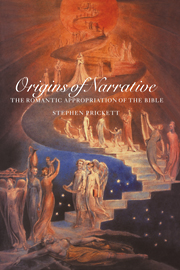Preface
Published online by Cambridge University Press: 06 November 2009
Summary
To start with what this book is not: it is not about the use of biblical plots or themes in Romantic literature, nor is it about the naturalising of supernaturalism associated with M.H. Abrams. Neither is it a literary analysis of the Bible of the kinds pioneered by Hans Frei or Northrop Frye. All are interesting topics, and much yet remains to be written on them. My theme, however, concerns the way in which the Romantics read the Bible itself: how it was responsible not merely for much Romantic literary theory, but had, in the process, been so irrevocably altered by the new hermeneutic assumptions it had engendered that it became for the nineteenth century virtually a different book from that of a century before. Beyond this lie other, more elusive, snarks: why, for instance, was the Romantic fascination with the evolution of self-consciousness so linked with notions of the origins of the Bible? And, perhaps even more important, how far is the creativeness and vitality of our literary tradition related to its biblical origins?
Moreover, as I began to trace this almost unnoticed Romantic transformation of the Bible, I quickly realised that it was far from being a unique event. Behind that particular and unusually well-documented story of hermeneutic re-interpretation lies another, of successive earlier appropriations resting upon one another, layer upon layer, until the question of an original biblical ‘ur-text’ becomes lost in the archaeology of time.
- Type
- Chapter
- Information
- Origins of NarrativeThe Romantic Appropriation of the Bible, pp. xi - xivPublisher: Cambridge University PressPrint publication year: 1996



